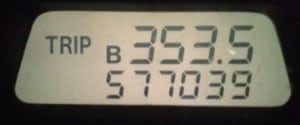

Just like your 86 year-old Grandmother who is still volunteering her help at the Senior Citizen center, good genes help! Your vehicle’s “genes” are “inherited” from the manufacturer. Go to Consumer Reports.org for a listing of the most reliable car for your purposes. Starting with a vehicle manufactured by a company with a known track record for reliability will help you begin your 200,000 mile journey.
After you’ve decided on the manufacturer, pick out a model with the features you are going to be happy with for a long time. Choosing a vehicle that you may keep for 200,000 miles is a bit like selecting a spouse…if you’re not in love with her (the car) before the wedding, it probably won’t improve after the wedding.
Now that you have selected your perfect “spouse” (car), it’s up to you to make your “marriage” last. To avoid unplanned surprises, use the rhythm method…follow a strict maintenance schedule. Maintenance costs are significantly less than repair costs, and will be your best insurance against surprise breakdowns.
Most owner’s manuals spell out when (in miles) to perform specific services…oil, filter and fluid changes, tire rotations, spark plugs, timing/serpentine belts, etc. They also recommend different service intervals (regular, severe, extreme) depending upon your driving habits, weather/road conditions and the regions temperature extremes. Most vehicles driven in CO should adhere to a “severe” conditions schedule due to our elevation and temperature extremes.
A cautionary note: Auto manufacturers are in constant price competition wars and heavily promote their “low ownership maintenance costs”. Yes, vehicles can be driven further and serviced less frequently than those manufactured 20 years ago.
However, please keep in mind the manufacturer only warranties their power trains for 50-100,000 miles…if you follow their “minimum” guidelines, you will usually get through that warranty period with minimal warranty problems. But what about the next 50-100,000 miles? Are you going to give your spouse “minimal” love during the first half of your marriage and then expect her (or him) to give you maximum love in your golden years? Heck no! So, why expect anything different from your car?
You’ve seen it in church…”all those married for 50 years or more, please stand up”. We all sit in utter amazement and admiration, then the pastor qualifies his request, “Now, all of you who have been happily married, please stay standing”. As funny as it may sound, the same holds true for you and your vehicle’s relationship…you make it 200,000 plus miles, but were they “happy” miles?
This next important tip may help you find vehicular nirvana…isn’t this exciting?!!
Don’t be a cheapskate when your “sweetheart” needs some new parts! Sure, you may save a few bucks by purchasing less expensive “after-market” parts, but will you be paying more in the long run? Keep in mind that the labor costs to replace broken or defective parts usually exceeds the cost of the parts. So, if you have to replace a cheap part twice instead of just once, it’s costing you significantly more in the long run. That said, some parts are not critical to your vehicles’ longevity and there are times when “cheap” may be OK.
If you are shopping for the best price, ask advice from your trusted Service Advisor if he (she) would recommend a less expensive after-market part, or should you stick to an original equipment manufacturer’s (OEM) part. If he is worth his salt, he’ll give you an honest and accurate answer.
Don’t you wish understanding your spouse was that easy???
Special thanks to Dan Kane for his fun writing style in this blog!




